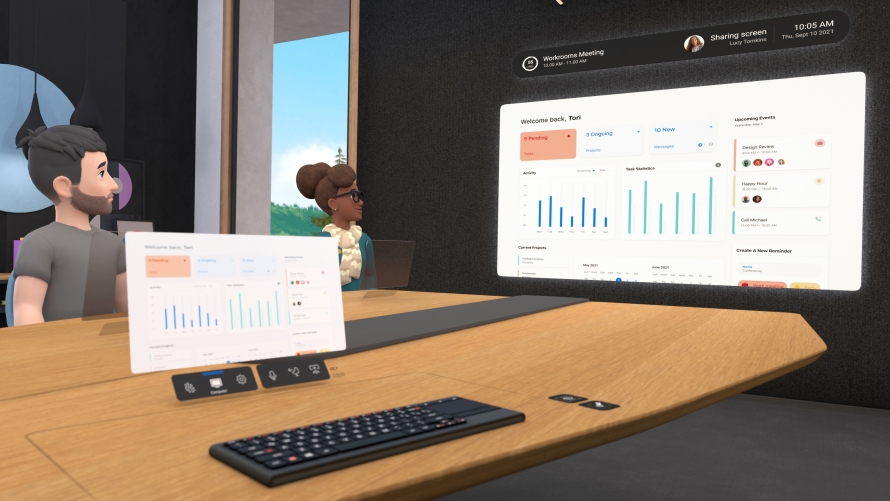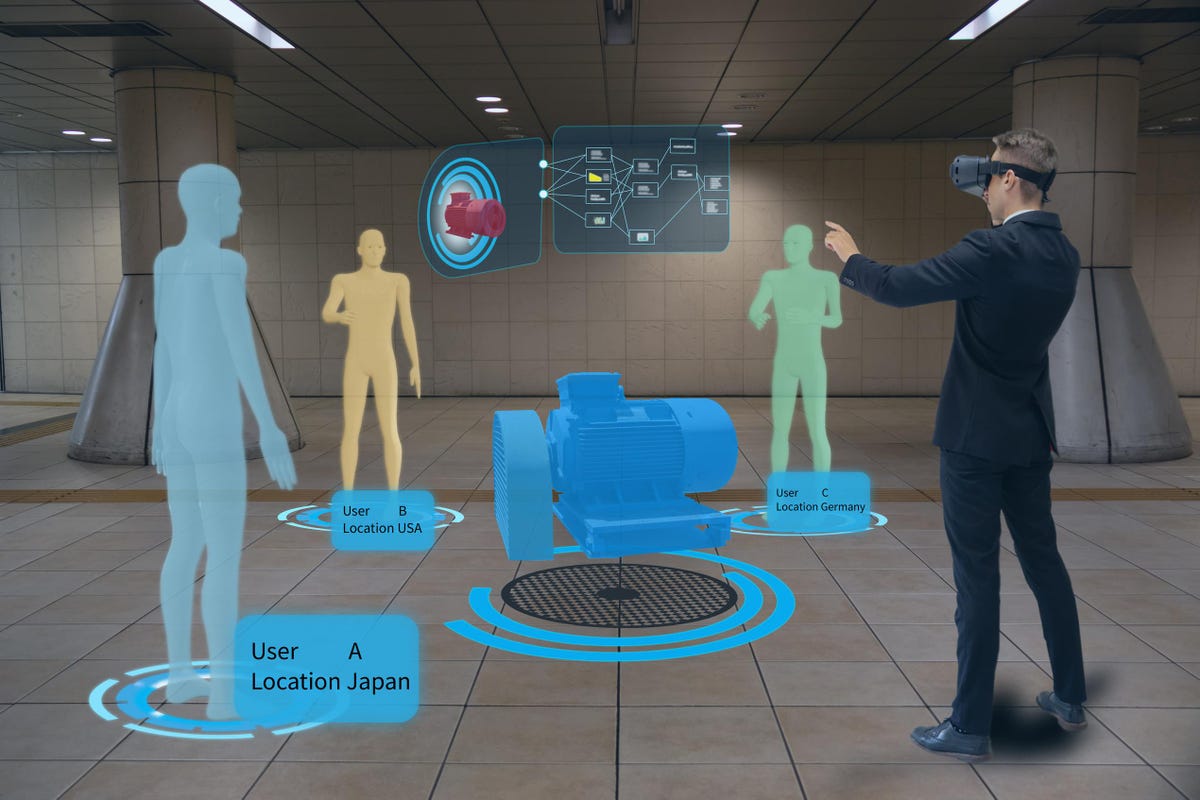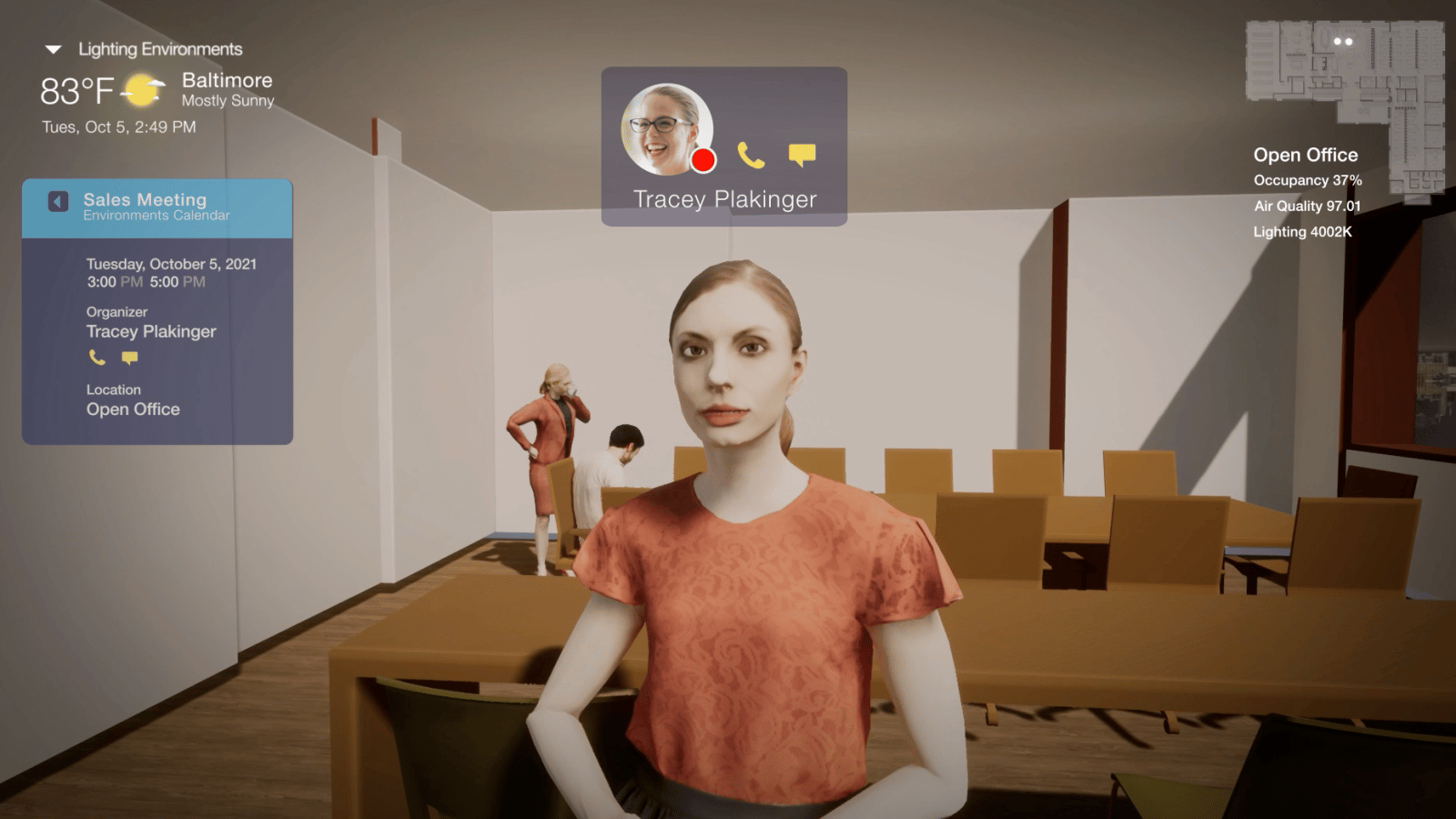Will the Metaverse enhance the office or will it replace it? What will it mean for teams, existing and new? Will the Metaverse be the new face of remote work?
.gif?width=776&name=office%20metaverse%20(1).gif)
The Metaverse has a few potential uses for the office environment. Marketers are often focused on what the Metaverse, VR, and AR can offer their customers in terms of experience, and neglect to consider how this tech can benefit them. From convenience to new opportunities, the potential for a meta-office has increased in recent years.
But there is a possibility for monitoring from management to ramp up. Having a 7-foot penguin controlled by your boss following you around the metaverse might be a bit unsettling. Especially when it starts squeaking about the quarterly reports.
This whole situation would have been almost unfathomable pre-pandemic. But because of the rapid uptake in remote working, offices and businesses are looking for solutions. The parts of remote working that damage office culture and productivity, such as accidental interactions, networking, physical presence and collaboration, can maybe be remedied by the Metaverse.
Just like the benefits it brings to the rest of society, a cohesive metaverse could help individuals work together in a shared space, and reduce duplication of effort thanks to increased communication. Businesses with remote workers and digital campaigns spend a lot of time online anyway, the metaverse would just require bringing these into one, unified environment.

But what other ways could the tech be featured in your office? Will you see a group of businesspeople shouting at each other with comically large headsets on? Will that penguin ever catch you wasting time playing Minecraft during work hours? Let's find out. But first, for all you meta-newbies, we need to ask:
What is the Metaverse?
Basically, the idea behind the metaverse is to create a space similar to the internet, but more tangible, so that users can interact with the world via digital avatars. Plus, unlike the modern internet, metaverse users experience environmental changes in real-time. If a user makes a change to the metaverse, this shift is visible to everyone.
In theory, you could sit around a virtual meeting table with colleagues from around the world, then break for lunch and head to a virtual art expedition, and then meet up for dinner with your friends when work ends.
And some big names are starting to see the potential behind it:
- Microsoft CEO Satya Nadella has recently said that his company is working on building the "enterprise metaverse."
- Epic Games reported a $1B funding round to support metaverse ambitions, pushing the Fortnite founder's valuation to nearly $30B.
- Mark Zuckerberg has expressed his vision for turning Facebook into a "metaverse company," even stating that he began thinking about the concept in school.
- Venture capitalist Matthew Ball helped launch an exchange traded fund so people can invest in the metaverse space, including companies like Nvidia and Roblox.
We will see a shift in the way people play, work, learn or simply hang out in 2021," says David Bazucki, CEO and Founder of Roblox.
"Some of this connection will move into the Metaverse, a digital place where people seamlessly get together and interact in millions of 3D virtual experiences. Early iterations of the Metaverse emerged in the 1980s with VPL Research’s DataSuit and Linden Lab’s Second Life in 2003.
However, it started to feel very real in 2020 as several platforms have been envisioning – and building – their own versions of the Metaverse.”
So, what makes it different to the internet? Well, current online platforms allow users to move about within the confines of the service, but limit interoperability between platforms. I mean, Twitter's aim is to get you to stay on Twitter, no matter what.
"You can build anything in “Minecraft,” but you can’t transfer your creations into a “Fortnite” map. The Metaverse will allow users to generate their own content and distribute it freely throughout a widely accessible digital world," reports Digiday's Alexander Lee.
Right, let's have a look at how all this can shake up your office. Virtual coffee anyone? We've got 5 minutes before the penguin comes back.
1. Training in the Metaverse
According to Dale’s Cone of Experience, people remember about 10% of what they read, 20% of what they hear, but 90% of what they do.
It makes sense, then, that many industries have adopted VR and AR to train their teams. Soldiers, surgeons, and astronauts have trained for decades using the tech. Recently, however, it has expanded into more general use. Employees from many other industries have begun to practise their crafts with headsets, including spaces such as retail, logistics, and customer service.
It is predicted that in less than 10 years, VR will be used in 23M jobs worldwide. This could be a tipping point for our entrance into the Metaverse.
Currently, the Metaverse is finding its home in the gaming community. So, it's a natural evolution for learning to develop gamified qualities, which can aid easier and faster skills acquisition.
PixelMax Founder Shay O'Carroll notes that "The game becomes the learning activity. In the medical world, we’ve used gamified technologies to train lab technicians; you’ll break out into different groups and then go to, say, a virtual PCR testing machine where you’ll go through stages of learning about how to operate that machine, with your training result then recorded.”

VR can also introduce realistic role-playing exercises and simulations. This will allow worker avatars to try out and resolve difficult "gameplay" scenarios, such as tricky customers, challenging employee conversations, and high-pressured sales presentations.
Already VR tech is being used in a number of industries to help their skills development:
- Surgical tech company Medivisis has been using Microsoft’s HoloLens technology to train students through highly-interactive 3-D anatomy models
- Embodied Labs use a 360-degree video to help medical workers experience the effects of Alzheimer’s Disease to assist in making diagnoses;
- Bosch and the Ford Motor Company have pioneered a VR-training tool, using the Oculus Quest headset, to train technicians on electric vehicle maintenance.
- Metaverse Learning has worked with the UK Skills Partnership to create a series of nine AR training models for nurses in the UK, using 3-D animation and augmented reality to test specific scenarios and reinforce best practices.
Virtual learning also can utilise AI-powered bots as instructors, that can assist learners when they are stuck, provide nudges, and set scaled challenges. Think a high-tech Clippy.
2. A Growing Metaverse Team
Tech is often blamed for the obsolescence of jobs within many industries. The effects of these developments can be contradictory and hard to predict. However, increased tech can also introduce new, fulfilling, and even highly automated, roles.
So, the Metaverse has the potential to create a whole new range of jobs and roles, including creative positions and tech-based software engineering roles.
In October last year, Facebook/Meta/the social media platform that knows what you ate last summer made a pledge to speed up the development of the metaverse. So, it's all hands on deck. But whose hands?
Well, the social media giant has committed to hiring 10,000 people in Europe over the next five years. People with metaverse-specific skills, in metaverse-specific roles. In fact, they recently posted 13 jobs with the word "metaverse" in them.
But they're not the only ones creating jobs in this space.
Fashion houses and clothing companies have become pretty bullish on the metaverse. And in particular NFTS. As a result, we've seen Gucci, Nike, and Balenciaga all start their search for their metaverse teams.
In fact, Nike has posted five jobs that reference the metaverse. This includes a listing on LinkedIn for a director of metaverse engineering, a principle innovation metaverse engineer, a senior 3D game designer, an expert innovation programme manager for the blockchain, and a virtual material designer.
But even legacy brands like Disney are getting involved.
The media juggernaut has posted a role for a manager of business development who will "help lead Disney's efforts in the NFT space".
So, what are some examples of potential job roles within the space? Well, we might see the emergence of:
- Metaverse Research Scientists
- Metaverse Creatives
- Virtual material designers
- Metaverse hardware builders
Number Three: Job Interviews
Job positions might not be alone in changing employment practices. The change may start before the position is even filled.
While the Metaverse probably won't get rid of the basics, such as the CV, it could change up the format of job applications and the process we go through to get a job.
This might look like job interviews being conducted in a secure virtual environment so that initial rounds don't have to be conducted in person. So, they could be completed remotely, but with all the benefits of easier communication that come from in-person meetings. This can streamline the process, saving time for both the company and potential employees.

The quality of the interview could also be improved. With the ability to create any situation or task, employers could create testing environments that see how the individual would react to a typical work task. This'll allow employers to gain a better understanding of the skills of the interviewee, and give the job seeker an insight into what the position entails.
Number Four: The Adoption of Cryptocurrencies
The introduction of a virtual currency is one of the main features of the complete Metaverse.
It's something which has already been implemented in existing examples of pre-metaverse spaces, such as games like World of Warcraft. So, we can begin to see how these digital currencies and economies could play out, albeit on a much bigger scale. So, players can earn money to buy items, just like in real life.
Some futurists believe that if the Metaverse grows to the scale predicted, the majority of work roles could be carried out using it in some way or another. This means digital currencies will need to replace physical ones. So, workers could see themselves being paid in Bitcoin, rather than Dollars, through the blockchain.
The Downsides of Metaverse Workplaces
However, it's not all virtual daisies and digital roses.
A recent study by arXiy found that working in the metaverse for an extended period of time can lead to high levels of anxiety, physical effects, and even the perceptions of higher workloads.
The study, which has not yet been peer-reviewed, compared the experiences of 16 university staff or researcher participants who spent a 35-hour workweek in physical office spaces, and another week doing the same work in virtual reality.
The researchers wrote that working in VR for a week resulted in “significantly worse ratings across most measures” for participants, particularly in terms of health effects and productivity.
Employee anxiety increased by 19% when working in the Metaverse, and the perception of the workload grew by 35%, despite researchers ensuring that workloads were similar. Additionally, employees reported their frustration with being unable to complete work in a timely or efficient manner increased by 42% while in VR, while self-reported productivity fell by 16%.
Will the Metaverse Replace the Physical Office?
Right now, the answer is a probable no. It'll take years before the technologies needed to do the job can mature and enable a full Metaverse.
But it is also likely that even when the tech is up to speed, the Metaverse won't replace the physical office. This is due to in-person interaction being a fundamental part of the human experience.
Despite how convenient the Metaverse will be, the human need for face to face interaction will act as a barrier to its full integration. The office is not just a place to work, but a space where people can collaborate, socialise and build relationships. This need has been proven during the pandemic, where the isolation was felt heavily by many individuals.
Plus, spending eight hours a day in the virtual world isn't too practical. There are health risks associated with too much online gaming, including sleep deprivation, insomnia and circadian rhythm disorders, depression, aggression, and anxiety. So, spending your 8-hour workdays in the metaverse may have similar effects.
So, similarly to how work is conducted now, the Metaverse will work in a hybrid sense, not replacing the office but enhancing it. Watch out for that 7-foot-tall penguin, though.
